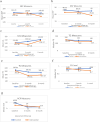Impact of a community pharmacy-based medication therapy management program on clinical and humanistic outcomes in patients with uncontrolled diabetes: a randomised controlled trial
- PMID: 39090152
- PMCID: PMC11294362
- DOI: 10.1038/s41598-024-65759-x
Impact of a community pharmacy-based medication therapy management program on clinical and humanistic outcomes in patients with uncontrolled diabetes: a randomised controlled trial
Abstract
This study was aimed to evaluate the impact of community pharmacy (CP)-based medication therapy management (MTM) program on clinical and humanistic outcomes in patients with uncontrolled diabetes. An open label, parallel-group randomised controlled trial was undertaken at a community pharmacy in Riyadh city, Kingdom of Saudi Arabia. Patients with a diagnosis of uncontrolled diabetes (HbA1c of ≥ 8%) meeting the eligibility criteria were randomised to receive either the MTM programme provided by pharmacists or standard care. The primary outcome was change in HbA1c over 6 months. Secondary outcomes included: changes in clinical parameters (blood pressure (BP), lipid profile, serum creatinine (SCr) and albumin-to- creatinine ratio (ACR)), types of drug-related problems (DRPs), health service utilization (HSU), adherence, diabetes distress and overall patient satisfaction with the service at 6-month. A sufficiently powered sample of 160 participants with a mean age was 50 years (SD ± 11.9) was recruited. The majority of the patients (68.1%) were male and had diabetes for more than eight years [IQR 3, 14]. After adjusting for baseline HbA1c, compared to the control group, the mean HbA1c level was 0.02% (p = 0.929) and 0.2% (p = 0.47) lower in the intervention arm at 3-month and 6-month respectively. However, these differences were not statistically significant. Nonetheless, within each arm, there was a significant improvement in HbA1c from baseline. Furthermore, the intervention arm demonstrated improvement in BP control (SBP lowered by 3.2 mmHg (p = 0.05) and DBP lowered by 3.8 mmHg (p = 0.008)). During the study period, none of the participants in the intervention group reported hospitalization or ER visits compared to 14 patients in the control group [OR 0.069 (95% CI 0.004, 1.3)]. Patient satisfaction as measured by Patient Satisfaction with Pharmacist Services Questionnaire 2.0 (PSPSQ 2.0) was significantly higher among MTM program participants compared to standard care (p = 0.00001). Patients in the MTM program were eight times more likely to be adherent compared to the patients in the standard care [OR 7.89 (95% CI 3.6, 17.4)]. MTM program metrics showed that per patient, the pharmacists spent a median of 35 [IQR 30, 44.5] minutes at the initial visit and 20 [IQR 10, 25] minutes during the 6-month visit. The number of DRPs had significantly dropped in the intervention arm at 3 and 6-month (p = 0.0001). In conclusion, CP-based MTM program can improve health outcomes and prevent hospitalisations in patients with diabetes. These findings support the implementation of CP-based MTM services for patients with diabetes in the Kingdom of Saudi Arabia.
Keywords: Community pharmacy; Medication review program; Pharmacist; Randomized controlled trial.
© 2024. The Author(s).
Conflict of interest statement
The authors declare no competing interests.
Figures





References
-
- United Nations Interagency Task Force on the Prevention and Control of Noncommunicable Diseases. The investment case for noncommunicable disease prevention and control in the Kingdom of Saudi Arabia: return on investment analysis & institutional and context analysis. Geneva: World Health Organization (2017)
-
- Todd, A., Copeland, A., Husband, A., Kasim, A. & Bambra, C. The positive pharmacy care law: an area-level analysis of the relationship between community pharmacy distribution, urbanity and social deprivation in England. BMJ Open10.1136/bmjopen-2014-005764 (2014). 10.1136/bmjopen-2014-005764 - DOI - PMC - PubMed
-
- Giberson, S., Yoder, S. & Lee, M.P. Improving patients and health system outcomes through advanced pharmacy practice. A report to the U.S. Surgeon General. http://www.accp.com/docs/positions/misc/Improving_Patient_and_Health_Sys... (2011)
Publication types
MeSH terms
Substances
LinkOut - more resources
Full Text Sources
Medical
Miscellaneous

